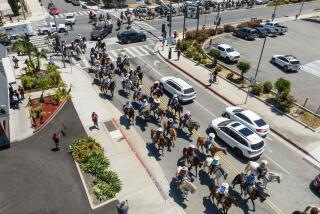Riding and Caring for Horses a Key Part of Curriculum
- Share via
OJAI — The way they see it at Thacher School, a kid can learn a lot about himself by shoveling manure at dawn.
Since 1889, every student at this exclusive college-preparatory boarding school has been assigned his own horse to care for--a commitment that includes feeding the steed, learning to ride and cleaning up the barn.
“I think it makes us a lot less pretentious,” said headmaster Willard G. Wyman. “Shoveling . . . in the morning keeps a lot of manure from being shoveled in the English papers in the afternoon.”
More than 1,000 graduates gathered this weekend to celebrate that earthy philosophy as Thacher marked the 100th anniversary of its founding on an old Ojai orange ranch 85 miles northwest of Los Angeles.
In the past, those imbued with Thacher’s unique brand of horse sense have included oilman Howard Hughes, playwright Thornton Wilder, “Mutiny on the Bounty” author Charles Nordhoff and the offspring of such familiar Western surnames as Livermore, Mudd, Chandler and Bechtel.
Today, the oldest private boarding school this side of the Mississippi River, Thacher continues to mix character-building equine tasks with a college prep program that routinely propels many of its 227 students into the Ivy League.
“The principles that my father believed in . . . a kind of puritanism, hard work, self-denial . . . haven’t changed,” said headmaster emeritus Anson S. Thacher, 84, the son of founder Sherman Day Thacher. “They may be old-fashioned, but they’re sound.”
On Saturday, at the school’s 400-acre campus perched on a scenic plateau at the base of Los Padres National Forest, the emphasis was on displaying those qualities.
With alumni dating back to the class of ’20 on hand, the current crop of teen-age students treated the crowd to a gymkhana demonstration, a show of horseback skill that traces its roots to the cavalry drills practiced during the Spanish-American War.
The competition, which Thacher students have been enjoying for nearly a century, includes relays, precision riding and tricks, such as speeding past a silver dollar and snatching it off the ground.
‘We’re So Sheltered’
“This teaches you discipline,” said Toby Rosenblatt, class of ‘56, a financial consultant and, until recently, chairman of the San Francisco Planning Commission. “This takes you away from thinking you’re the most important thing in the world.”
It is a discipline won hard. Not every student fully appreciates early-morning shoveling. Nor do they all value the school’s other regulations, which include mandatory 6:30 a.m. breakfasts, dorm room inspections and no television, Walkmans, or long hair and earrings on boys.
Other students, noting the heavy percentage of white, upper-middle-class teen-agers who pay $14,350 a year to attend the isolated campus, sometimes fret that such an environment isn’t adequately preparing them for the realities of urban life.
“We’re so sheltered here,” said senior April Taylor, 17, from Los Angeles. “A lot of kids are concerned because they know in the outside world it’s going to be totally different.”
But many say that Thacher School has instilled in them a new-found confidence, a sense of self-reliance that only four years of high-powered academics mixed with horsemanship could bring.
‘More in Charge of Myself’
“Being here has made me more in charge of myself,” said senior Rob Morrill, 19, from San Francisco. “You have to be more responsible for your life.”
That’s just what Sherman Thacher--a man fond of saying “there’s something about the outside of a horse that’s good for the inside of a boy”--would have wanted to hear.
A Yale-educated lawyer, Thacher came west in 1887 at the age of 25 to bring his sickly brother to the warm, dry Ojai valley. When his brother died a short while later, the Connecticut man decided to stay and raise oranges.
But when, in 1889, Thacher agreed to take on a friend’s nephew for a year of academic and outdoors instruction, a different kind of seed was planted. By 1891, there were five students; by 1900, 45.
In those days, of course, owning a horse was a necessity. Students had to ride the five-mile trek into Ojai every day just to pick up the mail. The church in town allowed the boys to attend services in cowboy boots because it was unsafe to ride in dress shoes.
‘First Control Yourself’
With the advent of the automobile, however, maintaining the equestrian program became more of a conscious effort to use horses as nonverbal teachers. The animals, administrators note, are at once dependent on their young caretakers and always capable of overpowering them.
“Fundamentally what it comes down to is that you can’t control a horse unless you first control yourself,” said Anson Thacher, who retired from the school in 1970.
While the school’s commitment to academic rigor and personal responsibility has been altered little over the years, the Thacher administration has adjusted some policies to reflect the changing times.
Where once students were required to care for a horse all four years, the program is now mandatory only for freshman. Women, who were excluded from the school until 1977, now compose half the student body.
And, in an effort to promote diversity at the school, Thacher has launched a fund-raising drive to expand from 20% the number of students who receive scholarships.
Still, Wyman, the school’s headmaster, is quick to caution that Thacher will always remain something of a dinosaur in the Computer Age, relying on the wisdom of four-legged animals as the antidote to dehumanizing, high-tech trends.
“We’re square here,” Wyman said. “We try to be different. There’s nothing cool about getting up at 6 in the morning to rake a corral.”






